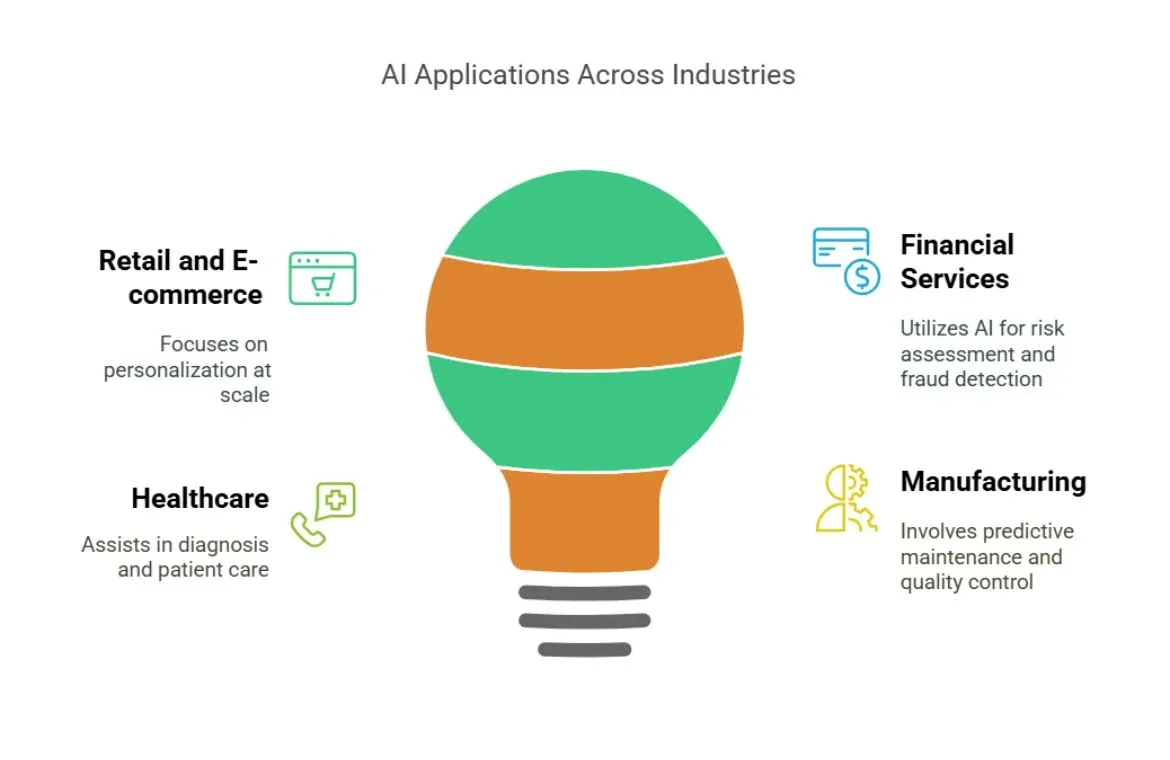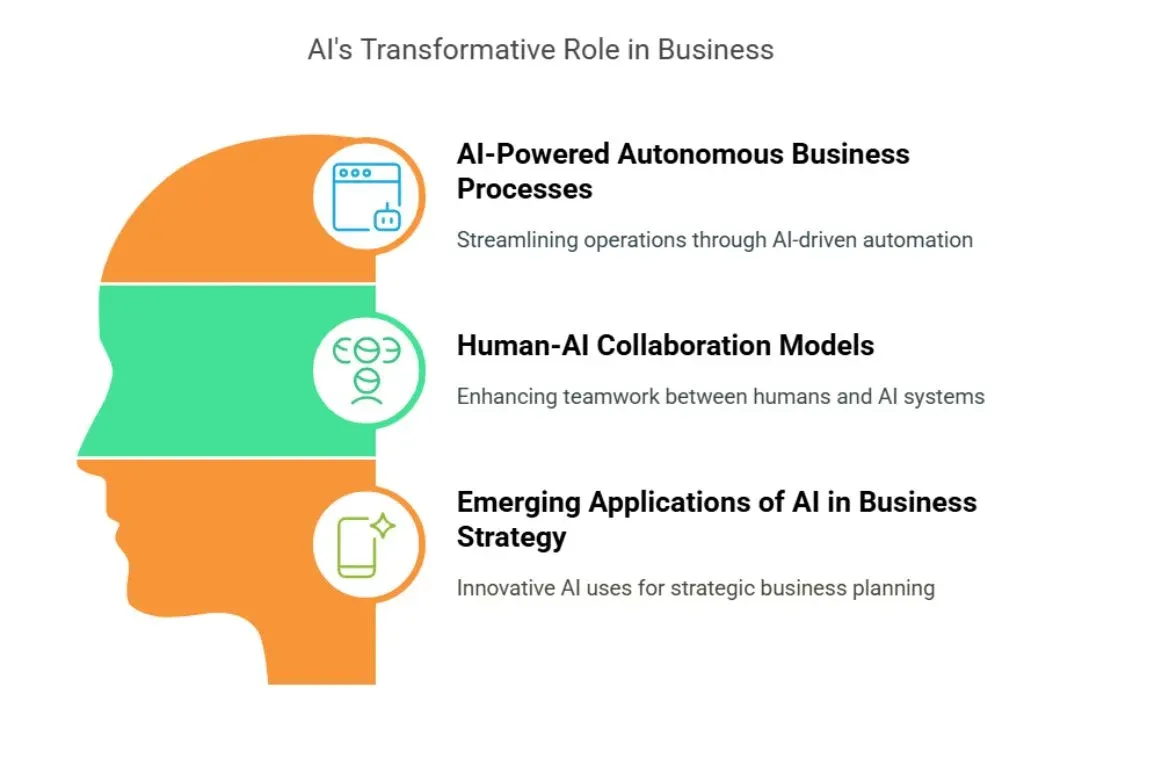How AI Is Adopted in Modern Business Operations?

The AI market worldwide will grow from £621.19 billion in 2024 to £2.74 trillion by 2032. This growth reshapes the way businesses operate today. Most organizations have embraced AI, and 72% use it in at least one business function. Sales teams that leverage AI tools have seen better results.
Understanding the Business Value of AI
AI has become the life-blood of strategic growth for businesses worldwide. Organizations believe AI and machine learning will help them grow revenue, boost operational efficiency, and improve customer experiences.
Key benefits of AI for modern businesses
Modern businesses gain measurable advantages from AI in all functions. AI goes beyond routine tasks by analyzing huge amounts of data to provide insights that drive strategic decisions. Employee productivity improves significantly when AI automates activities that usually take up 60-70% of their time. This automation capability extends to:
- Optimized workflows and business processes
- Better accuracy and fewer human errors
- Customised customer experiences through data analysis
- Better decision-making with predictive insights
Businesses see measurable ROI because AI makes the cycles between design and commercialization shorter.
Common myths about AI in business
Several myths about business AI persist despite its widespread adoption. AI doesn't replace human workers - it makes human capabilities stronger by handling repetitive tasks so the core team can focus on strategic initiatives.
There's another reason why some hesitate: they think AI needs perfect data to start. AI models actually work well with imperfect data and get better over time.
People also think AI belongs only to large companies with big resources. In spite of that, cloud-based AI services and pay-as-you-go pricing models have made AI accessible to everyone.
How AI drives competitive advantage?
Companies gain competitive advantages through AI in multiple ways. AI separates businesses from competitors by analyzing customer data to create customized experiences. On top of that, it makes operations faster and more efficient, creating a performance gap that competitors find hard to close.
AI gives companies a strategic edge through better forecasting and decision-making abilities. Small enterprises find AI particularly helpful as it levels the playing field against industry giants.
Business leaders need to act fast - 79% of corporate strategists agree that AI and analytics will determine their organization's success in the next two years. Companies that don't adopt AI risk falling behind their more adaptable competitors.
How Different Industries Are Leveraging AI?
Companies in all sectors now use AI to tackle industry challenges and gain competitive edges. A look at how different industries use this technology shows unique ways it's applied and common benefits in efficiency and breakthroughs.

Retail and e-commerce: Personalization at scale
Retailers can now offer customized experiences by analyzing their customer's data. AI doesn't just recommend products - it studies browsing patterns and buying history to predict future purchases. ‘
Financial services: Risk assessment and fraud detection
Banks now exploit AI to spot fraud by analyzing live transaction data and quickly finding unusual patterns like multiple purchases from different locations.
Machine learning helps banks watch card transactions and spot fraud with unmatched accuracy. It also makes risk assessment easier by processing huge datasets. This improves credit decisions and cuts down operational, regulatory, and compliance costs.
Healthcare: Diagnosis assistance and patient care
AI makes healthcare diagnoses more accurate and helps catch diseases earlier. The technology has reached impressive accuracy rates, including 93% in heart disease classification.
Technology also reshaped the scene in oncology. It enables customized cancer treatments through genomic analysis that finds mutations and tailors therapies to each patient's cancer profile.
Manufacturing: Predictive maintenance and quality control
AI-powered quality checks catch product defects that humans might miss. Visual Inspection AI customers have made their accuracy 10x better compared to general-purpose machine learning approaches.
AI also predicts equipment failures by analyzing data and schedules repairs before breakdowns happen.
Essential AI Applications Transforming Business Operations
Businesses now make use of AI-powered technologies that transform their operations. These smart applications bring measurable gains in efficiency, customer satisfaction, and decision-making abilities.
Customer experience and engagement tools
AI boosts customer interactions at multiple touchpoints. Smart chatbots work around the clock and handle simple questions without human help. AI also analyses customer feedback to spot pain points and opportunities.
Quality assurance powered by AI scores agent performance objectively. It detects customer sentiment and spots areas that need up-to-the-minute coaching.
Data analysis and business intelligence
AI analytics turns raw data into useful insights through machine learning, natural language processing, and data mining. This technology spots patterns by exploring historical data that humans might miss.
AI-powered descriptive analytics helps understand past performance better. Predictive analytics uses historical patterns to forecast future outcomes. The system processes unstructured data like images, videos, and text to find valuable information.
Process automation and workflow optimization
Smart automation blends AI's analytical power with automation tech to create simplified processes. Companies cut costs and build consistency by automating routine tasks.
Process mining tools track workflow performance. They find bottlenecks and show where AI fits best. Organizations can automate up to 40% of customer interactions across business functions.
Decision support systems
AI-powered decision support systems (DSS) help integrate and process information better. These systems guide humans toward smarter decisions with relevant data and suggestions.
Advanced DSS uses natural language processing on unstructured data to extract insights for analysts. Investment decision-making benefits greatly from this tech. DSS analyses financial reports, news articles, and social media posts to create recommendations.
Future Trends: How AI Will Transform Business by 2030
AI will revolutionize how businesses operate in every sector by 2030. McKinsey's research shows that companies will achieve complete data integration by 2030. AI systems will be embedded throughout their processes and decision points to drive automated actions. This change brings massive economic opportunities. PwC estimates AI's contribution to global GDP could reach INR 1324.77 trillion by the decade's end.

AI-powered autonomous business processes
Autonomous business operations will become the norm by 2030, not just experimental technology. AI deployment across value chains will allow systems to:
- Adjust automatically to environmental changes
- Learn from customer data gathered from multiple sources
- Create forecasts using machine learning with minimal human oversight
Quantum-sensing technologies will produce more accurate, live data about product performance. Applied AI capabilities will analyze this data to suggest targeted updates. AI agents powered by detailed customer information will work with digital twins. They will test customized products and services before ground deployment.
Human-AI collaboration models
Experts call it "collaborative intelligence" - humans and AI working together seamlessly in 2030's workplace. Yes, we'll likely have AIs as personal assistants, tutors, career counselors, and therapists.
This transformation recognizes the complementary strengths of humans and machines. AI excels at data processing and repetitive tasks. Humans bring creativity, empathy, and critical thinking to the table.
Emerging applications of artificial intelligence in business strategy
AI will revolutionize strategic decisions through advanced scenario analysis and tactical gaming. Business leaders will make strategic choices faster by 2030, while avoiding cognitive biases.
Business leaders won't just use AI to improve productivity, even though 39% of current skills may become outdated between 2025-2030. They'll create completely new business models. Successful organizations will balance immediate productivity gains with ambitious "moonshots." This approach will fundamentally change how they create value.
Overcoming Challenges in Business AI Adoption
Organizations need to overcome their biggest hurdles to make AI work. Statistics show that 95% of organizations face challenges during AI implementation. A strategic approach will lead to success in the long run.
Addressing data quality and integration issues
AI shows great promise, but poor data quality blocks its effective deployment. 80% of organizations think their data is ready for AI, yet 52% struggle with data quality during implementation. This shows a big gap between what companies believe and what's real. Data remains trapped in departmental silos. This fragmentation makes it hard to get a complete picture.
Companies must deal with data formats that don't match across different sources. A reliable data governance framework with clear policies and roles will give accurate and dependable data.
Building AI skills within your organization
The talent shortage creates another major roadblock. According to a source, 62% of executives say a skills shortage is their biggest AI challenge. Leadership faces its problems - only fewer organizations have started meaningful upskilling initiatives. The majority of leaders don't feel confident about their executive team's AI knowledge.
Companies can succeed at upskilling by:
- Looking at what different teams need
- Making executives responsible for training programs
- Creating hands-on AI learning chances
- Tracking how well the learning pays off
Leaders must talk openly with their teams. They should shift the conversation from fears about "replacement and loss" to AI's power to "augmentation and improvement".
Managing ethical considerations and risks
Privacy, bias prevention, and human judgment shape ethical AI use. Teams from different backgrounds should work together to create ethical frameworks that protect human rights, privacy, and fairness.
Companies should have strict rules about handling sensitive data. This matters because 71% of organizations rank AI privacy as their top concern. Leaders must check AI sources and outputs and give proper credit. Without careful watching, AI can copy old biases or make new ones. This happens often in lending, where past discrimination patterns might continue.
AI adoption works best when technology and human oversight work together. You can't just "set it and forget it" with AI.
Conclusion
AI has become a game-changing force that reshapes how modern businesses operate. Companies face hurdles with data quality and skills development, but the rewards of successful AI adoption are substantial in businesses of all types. Organizations actively using AI report better revenue, improved operations, and happier customers.
AI doesn't replace human workers - it enhances their capabilities through smart automation and informed decisions. Smart businesses that implement AI thoughtfully while addressing ethical concerns set themselves up for long-term growth in today's digital economy.
The next decade will see AI deeply woven into business processes, which creates fresh opportunities for state-of-the-art growth. Companies building their AI capabilities now will gain the upper hand over competitors who wait. This advantage comes when they focus on proper data governance and workforce development.
To effectively lead in this evolving landscape, consider enhancing your skills with programs like the AI for leaders course offered by TalentSprint in collaboration with IIM Calcutta. This course provides leaders with the tools and knowledge necessary to leverage AI's potential, ensuring your organization thrives in the age of intelligent automation.
FAQs
Q1. How is AI transforming modern business operations?
AI is revolutionizing business operations by enhancing decision-making, enabling personalized customer experiences, and improving efficiency through automation. It's being used for data analysis, process optimization, and predictive analytics across various industries, leading to increased revenue and competitive advantage.
Q2. What are some key applications of AI in different industries?
In retail, AI enables personalized shopping experiences. Financial services use AI for risk assessment and fraud detection. Healthcare leverages AI for diagnosis assistance and personalized treatments. Manufacturing benefits from AI-powered predictive maintenance and quality control.
Q3. How can businesses overcome challenges in AI adoption?
To successfully adopt AI, businesses should focus on improving data quality and integration, invest in upskilling their workforce, and establish ethical frameworks for AI use. It's crucial to implement robust data governance policies and create interdisciplinary teams to manage AI implementation.
Q4. What future trends can we expect in business AI by 2030?
By 2030, we can expect to see more autonomous business processes, seamless human-AI collaboration models, and AI deeply embedded in strategic decision-making. AI will likely contribute significantly to global GDP and create new job opportunities while transforming existing roles.
Q5. How does AI enhance customer experience in business?
AI enhances customer experience through intelligent chatbots providing 24/7 support, personalized product recommendations, and sentiment analysis of customer feedback. It also enables businesses to deliver targeted marketing campaigns and improve overall customer satisfaction through data-driven insights.

TalentSprint
TalentSprint is a leading deep-tech education company. It partners with esteemed academic institutions and global corporations to offer advanced learning programs in deep-tech, management, and emerging technologies. Known for its high-impact programs co-created with think tanks and experts, TalentSprint blends academic expertise with practical industry experience.



